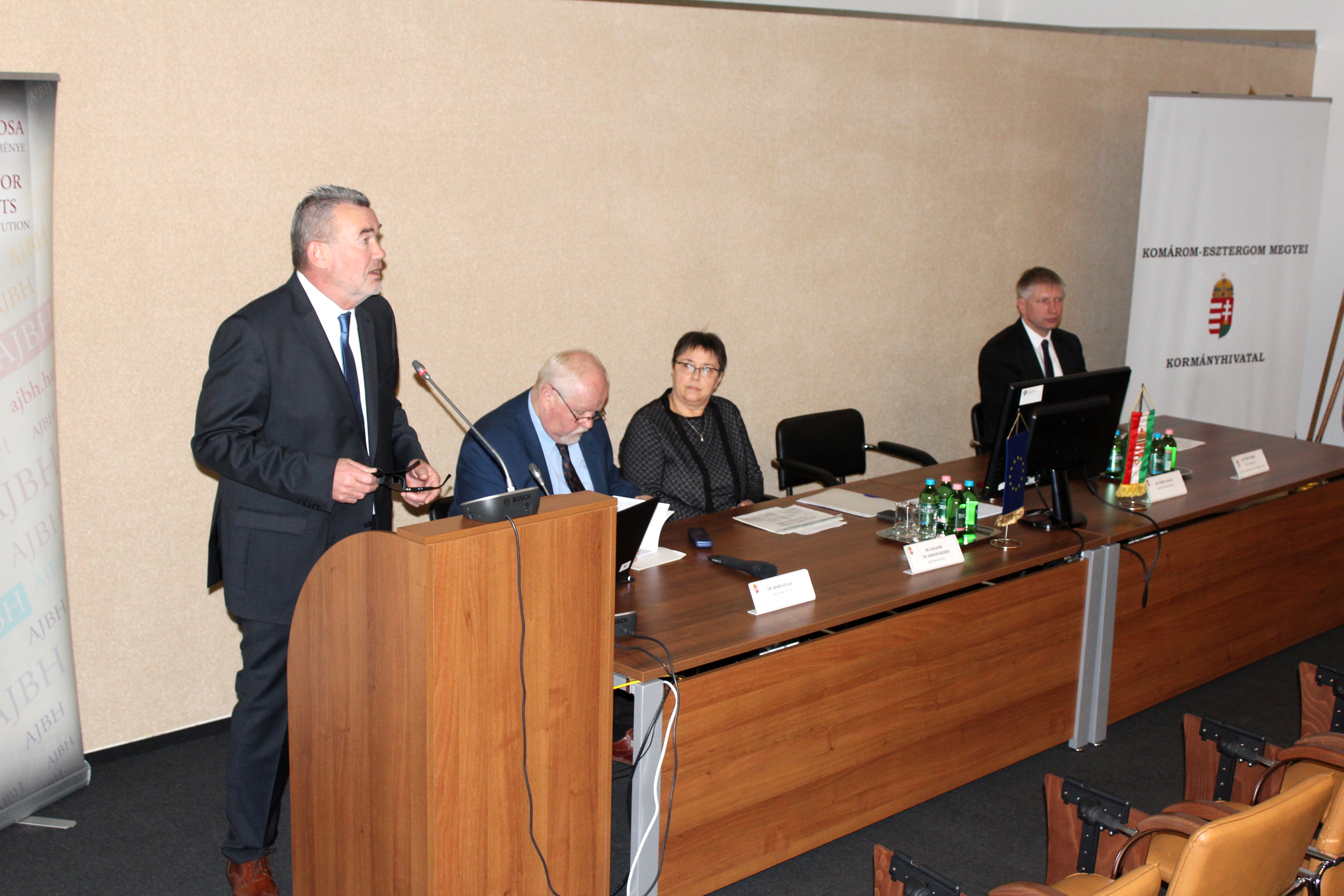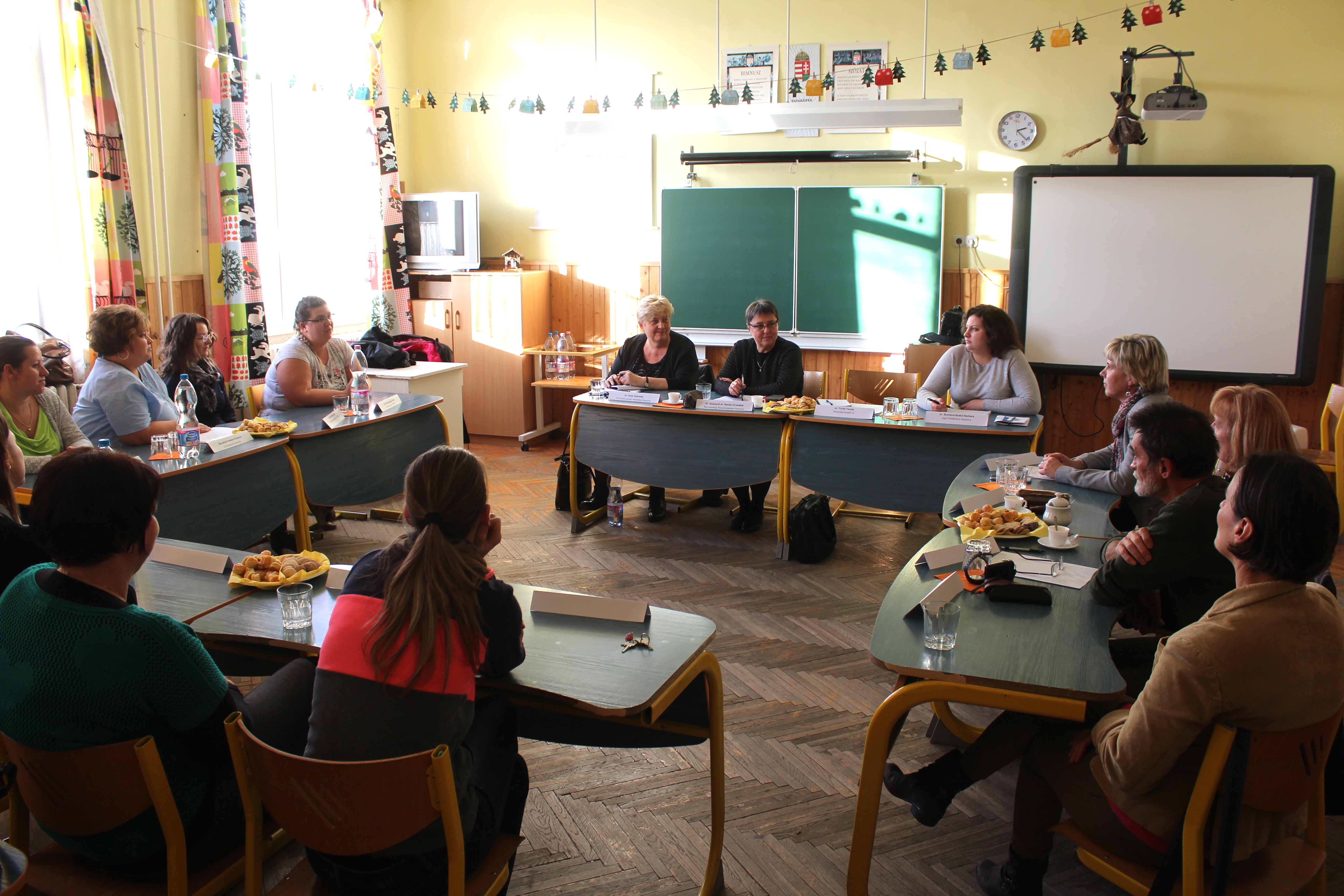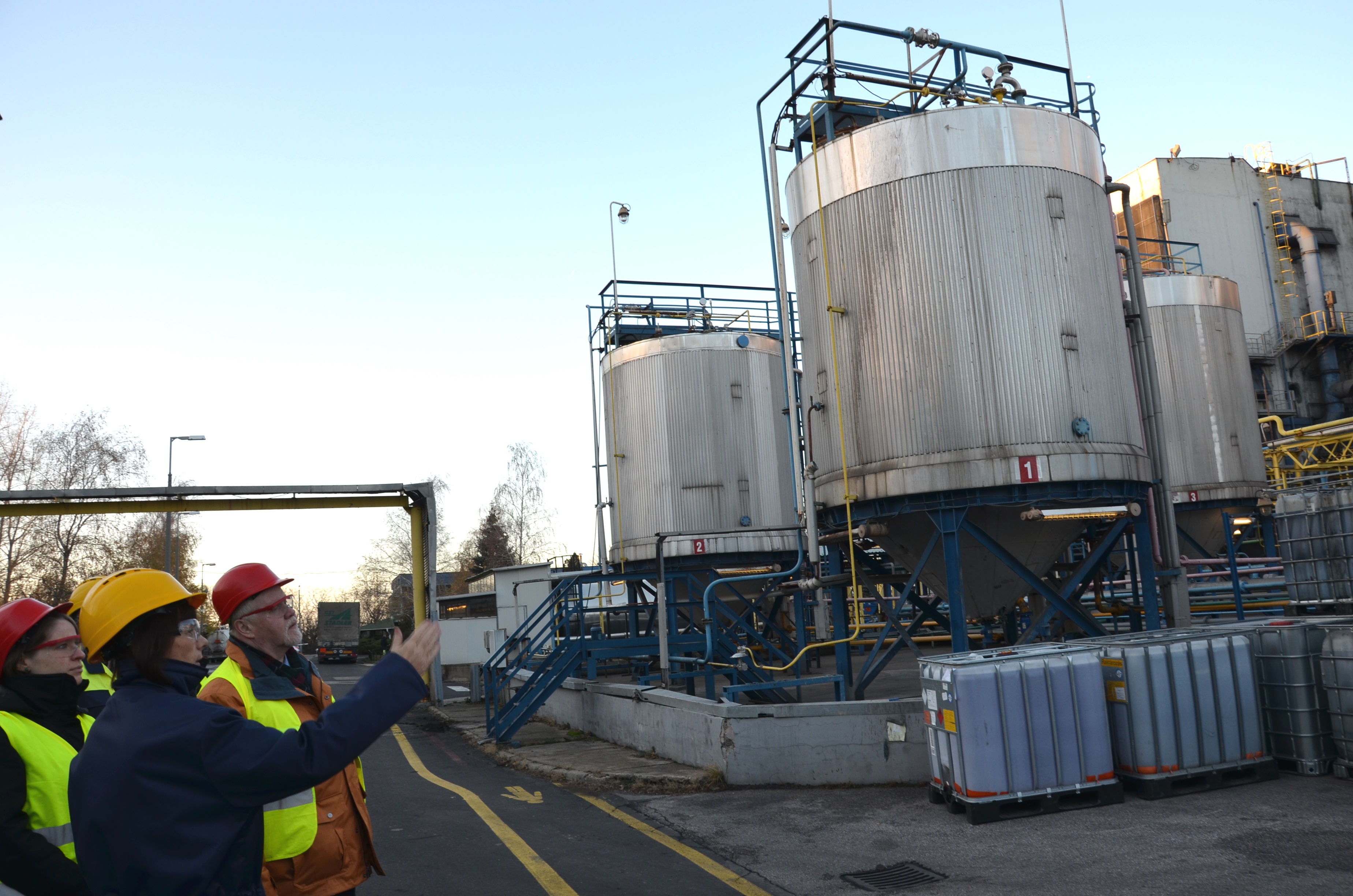Work visit by the Commissioner for Fundamental Rights and his two deputies to Komárom-Esztergom County December 5-6, 2018
The series of county visits and consulting days, which are held twice a year, was resumed by Commissioner for Fundamental Rights László Székely in Komárom-Esztergom County on December 5-6, 2018. The Ombudsman was accompanied by Deputy Commissioner for the Rights of National Minorities Elisabeth Sándor-Szalay and Deputy Commissioner for Future Generations Gyula Bándi, who mostly followed their own agendas but sometimes joined the Commissioner too.
László Székely and his two deputies presented the tasks and activities related to the protection of fundamental rights to the county clerks at the Komárom-Esztergom County Government Office. In addition to the general information, they also shared some details on the experience gained from their earlier and recent inquiries in the county. They explained that this region was not one of the “complaining” counties and that, during their preliminary inspections, no such fundamental rights-related issues were identified in the county which would be in any way different from the national average. Elisabeth Sándor-Szalay spoke mainly of the situation of national minority education, stressing the role of the cooperation between the local governments and national minority self-governments in the strengthening of the national identity of children and young people. In his talk, Gyula Bándi mentioned that in their daily work, the county clerks have the chance to promote the protection of the environmental interests of the future generations in many different ways, as the decisions adopted by the municipalities often directly affect biodiversity and the components of the natural and cultural heritage.

As a part of his visit, László Székely visited the 25th Klapka György Infantry Brigade of the Hungarian Defense Forces. The acting commander and his direct subordinates informed the Ombudsman of the history, organizational structure and responsibilities, as well as missionary roles of the brigade, and their liaising with the NGOs. The Ombudsman paid a short visit to the county headquarters, where, after receiving some information on the operation of the headquarters and police stations, the criminal situation of the county, the peculiar features thereof, as well as the effectiveness of the exploration of and investigation into the crimes, he was also shown the county police detention facility. The Commissioner concluded that the equipment of the cells was in line with the requirements, the obligatory sanitary ware was available and the quality of food was also appropriate.
Most of the agenda of Deputy Commissioner for the Rights of National Minorities Elisabeth Sándor-Szalay in the county consisted of studying the situation of national minority education. She paid a visit to the Vitéz János Center for Teacher Training at the Faculty of Humanities and Social Sciences of Pázmány Péter Catholic University, where, in addition to presenting the achievements of German and Slovakian nationality higher education, the structural deficiencies of the system of nationality teacher training, the possibilities for cooperation with the teacher training institutes of the mother countries, as well as the lack of lecture notes and university textbooks for nationality teacher training were also discussed.
At the Felsőgalla (Obergalla, a district of Tatabánya) German national minority primary school, the Deputy Commissioner heard about not only the significant achievements in strengthening the German identity and the dynamic development of the knowledge of the language but also, about the problems affecting education, for example, that the lack of textbooks, audio materials, that of the development of creative devices and succession, as well as the excessive amount of classes held for the children pose great challenges for both the teachers and the students.
The Deputy Commissioner also visited the Fekete Lajos Slovak National Minority Member Institution of the Vaszary János Primary School at Tardos, a settlement near Tatabánya, whose teachers, in joint efforts with the National Slovak Self-Government, the settlement’s Slovakian national minority self-government, as well as the mayor of the village, are committed to preserving and strengthening the Slovakian identity, in order to cherish and develop the local Slovakian traditions.
Elisabeth Sándor-Szalay held discussions with the staff of the Jelenlét (Presence) Program of the Hungarian Charity Service of the Order of Malta working at the Hatos slum. In Tatabánya, the Hungarian Charity Service of the Order of Malta opened a community center in two of the three ghettoes and one endangered area. A community bath and laundry services were made available in the service centers, along with an office of the Hungarian Charity Service of the Order of Malta, where continuous assistance on debt settlement and finding employment, among others, is provided to those in need. Besides the locally employed social workers, the lecturers and students of the Budapest University of Technology and Economics also support the elimination of residential segregation by providing architectural designs.
With the representatives of the settlement and regional level municipalities working in the county, the Deputy Commissioner primarily discussed the results of the cooperation between the local and the settlement level national minority self-governments, the issues related to task-based support, national minority education, the process of language attrition, as well as the upcoming local elections and the anomalies related to the national minority name lists, furthermore, that they are also going to use the press and the social media to start communication, first of all, with the children and the young people.

At the Bánhida Slovak House, which is at the same time the Regional Cultural Center of the National Slovak Self-Government, the improprieties related to the registry of the national minority name list and the relevant procedure, the issue of the scope of sensitive data recorded in the course of the population census, the results and challenges of language education, as well as the potential remedies related to task-based support were brought up for discussion with the deputy commissioner. The hosts showed the visitors their homepage called banhida.hu, indicating that their 120-hour motion picture material is suitable for both research and education but they need financial resources for the digitalization of these materials.
Deputy Commissioner for Future Generations Gyula Bándi visited Hungary’s largest hazardous waste burning plant at Dorog, where an annual appr. 50,000 tons of pharmaceutical, chemical and automotive industry waste is disposed of. The deputy commissioner was glad to see that the waste burning plant was working without generating residential complaints, in a transparent manner, in compliance with the Hungarian and European Union limits.
During his visit to Komárom-Esztergom County, the Ombudsman for Future Generations met with the representatives of the local civil society organizations fighting for the protection of the several tens of thousands of water birds spending their winter at Lake Öreg in Tata, and also, with the mayor of Tata. A few weeks ago, the Municipality of Tata adopted the first local decree of Hungary to ban fireworks in the period between November 1 and February 28 on the grounds of nature protection. Earlier, all the wintering water birds fled from the lake after the New Year’s Eve fireworks and most of them never returned, although the wintering season would normally last even until March. The cooperation between the local nature protection NGOs and the municipalities is exceptional and exemplary not only in Hungary but on an international level as well.

Tata, the “town of wild geese” has recently won the international Ramsar Wetland Conservation Award. Lake Öreg is unique in the world also because it is a water habitat protected by the international Ramsar Convention, it is in the heart of the city and it is thus an exceptional scene of the cohabitation of humans and nature.
Gyula Bándi also visited one of the seven eco-villages of Hungary, Agostyán. It is the lifestyle of humans living in harmony with the landscape that is promoted here, the Natural Living Foundation also performs significant environmental education activities. The Ombudsman for Future Generations emphasized that he finds it very important for similar forest schools and environmental education programs to receive more attention in education than before. For this, it is of critical importance that the government should support the participation of schools in such programs both with financial resources and statutory requirements.